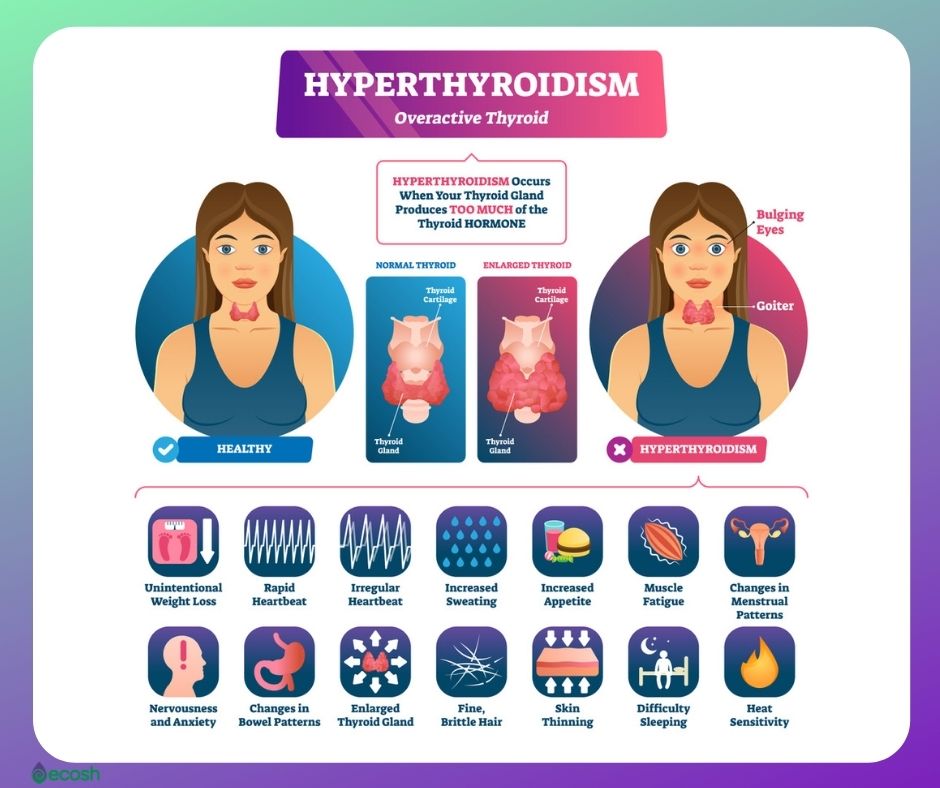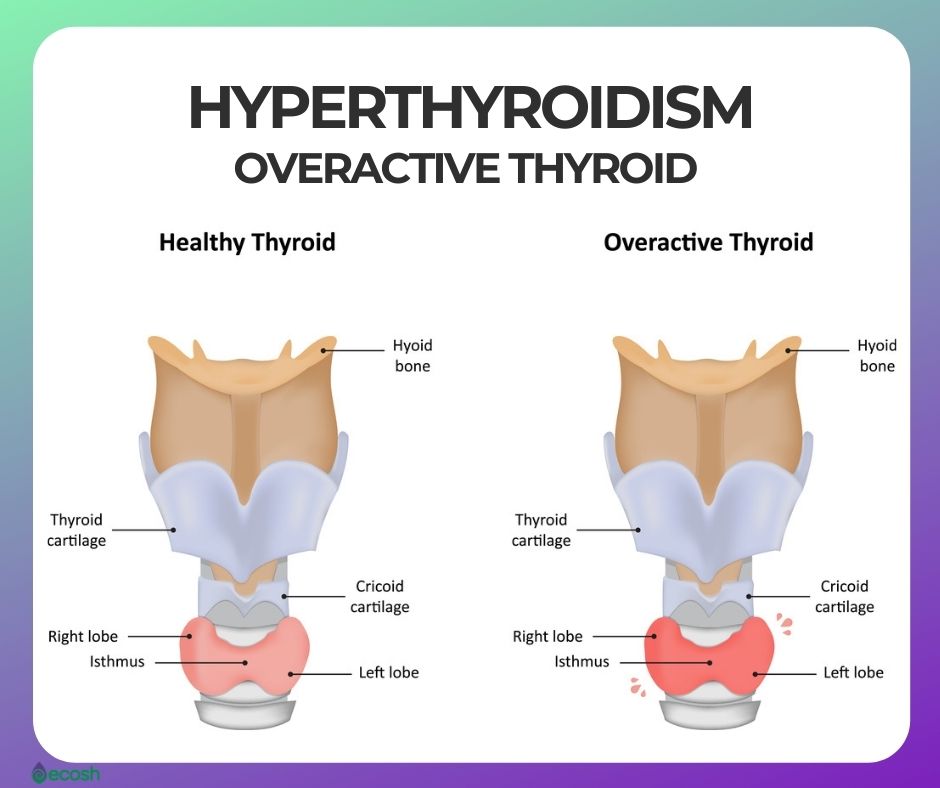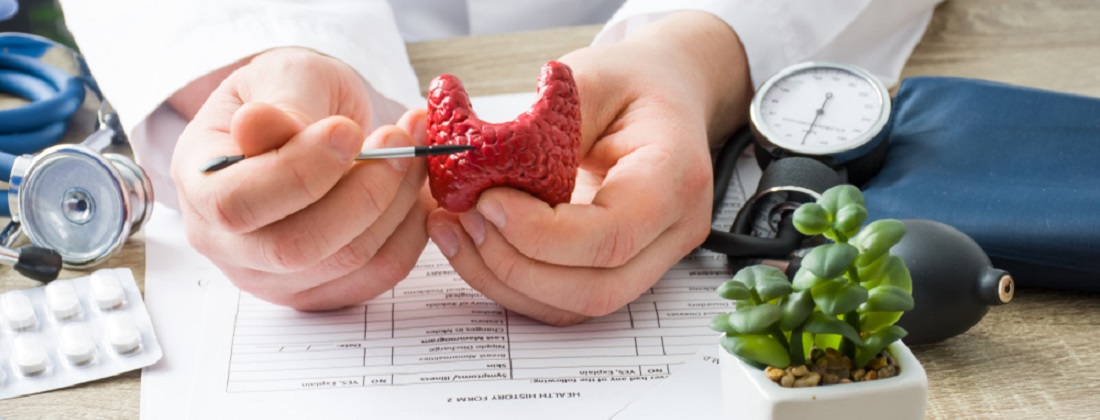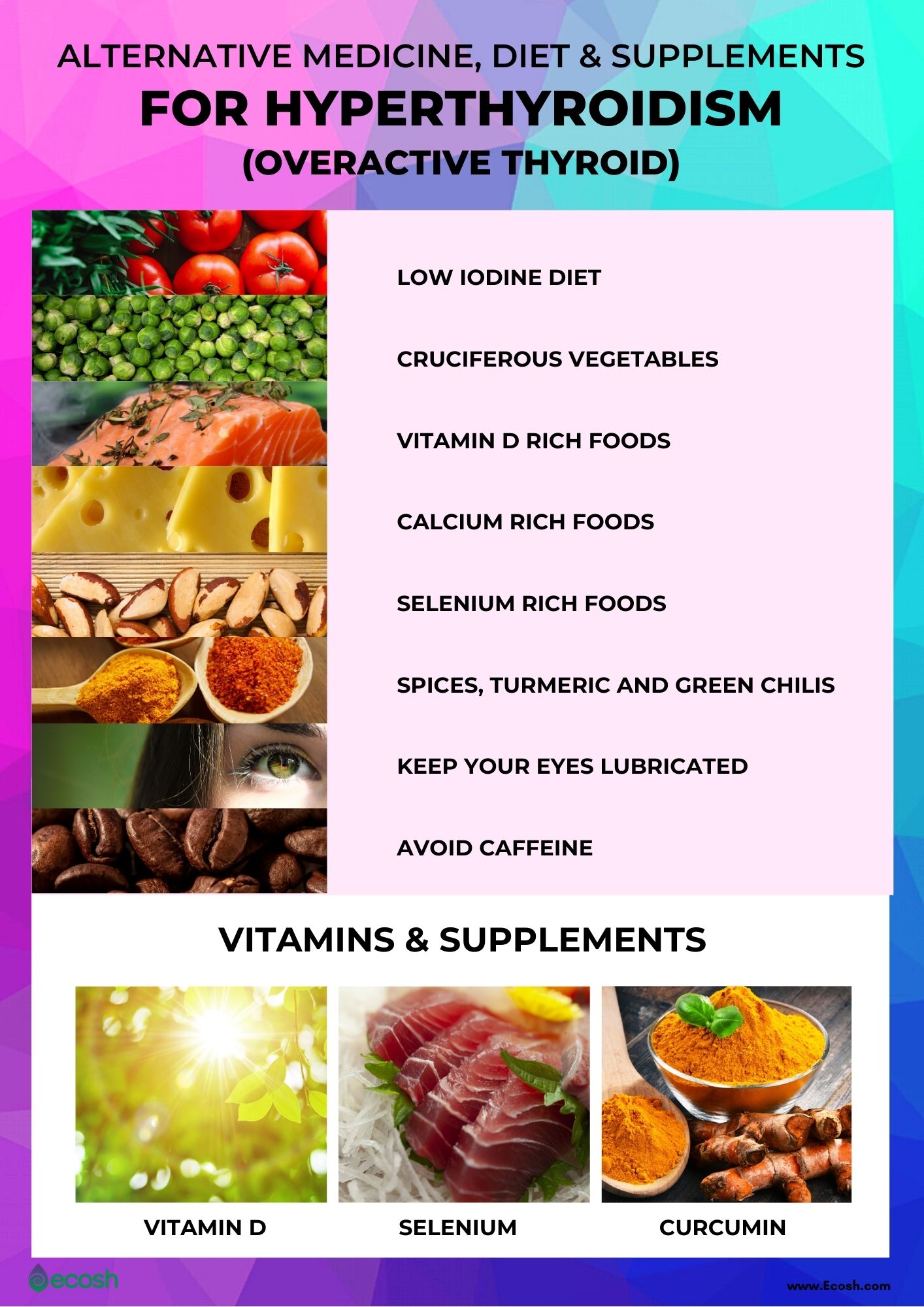Hyperthyroidism means that the thyroid gland is overactive. As a result, it makes too much of its hormone and causes your body to use energy too quickly. Thyroid disease is a general name for a medical health condition that does not allow your thyroid to make the right amount of hormones that control metabolism (a process where the food you eat is transformed into energy).
The thyroid, which is a butterfly-shaped gland that`s located low on the front of the neck below your Adam’s apple, wrapped around the windpipe (trachea), controls your metabolism with a few specific hormones which are created by the thyroid and tell your body’s cells how much energy to use — T4 (thyroxine, contains four iodide atoms) and T3 (triiodothyronine, contains three iodide atoms).
When your thyroid functions as it should, it will maintain the right amount of hormones to keep your metabolism working at the proper speed and creates replacements as the hormones are used.
However, if your body produces too much thyroid hormone, you may develop hyperthyroidism. While at the other hand, if your body produces too small amounts of thyroid hormone, you may develop hypothyroidism.
In addition, this is all supervised by the pituitary gland (located in the center of the skull, below your brain), which monitors and controls the amount of thyroid hormones in your bloodstream. When the pituitary gland senses an imbalance of thyroid hormones in your body, it will adjust the amounts with its own hormone called thyroid stimulating hormone (TSH). As a result, the TSH will be sent to the thyroid and it will tell the thyroid what needs to be done to get the body back to normal (1).
These two main disorders are serious and need to be treated by your healthcare provider. However, along with conventional treatment you may find some help in home remedies, changes in diet as well as in some vitamins.

Thyroid Disease Types
Common disorders of the thyroid are Graves’ disease, Hashimoto’s thyroiditis, thyroid nodules and goiter.
- Hyperthyroidism. In hyperthyroidism, the thyroid gland is overactive. As a result, it makes too much of its hormone and causes your body to use energy too quickly. It affects about 1 % of women and is less common in men. Most common cause of hyperthyroidism is Graves’ disease (affects about 70 % of people with an overactive thyroid). However, nodules on the thyroid (toxic nodular goiter or multinodular goiter) can also cause the gland to overproduce its hormones.
- Hypothyroidism. In hypothyroidism the thyroid gland is underactive, and can make too little thyroid hormone. For instance, in the US, it affects about 4.6 % of people 12 years old and older, and is often caused by Hashimoto’s thyroiditis, surgery to remove the thyroid gland, or damage from radiation treatment (29, 30, 31, 32).

Hyperthyroidism Symptoms and Signs
Mostly the symptoms of thyroid disease can be separated into two groups – those associated with having too little thyroid hormone (hypothyroidism), and those associated with having too much thyroid hormone (hyperthyroidism). Although thyroid disease may cause many different symptoms, it’s unlikely you’ll undergo all of them.
However, many signs of both – hypothyroidism, and hyperthyroidism are often similar to the symptoms of other medical conditions, so it can easily be confused for something else. In case an overactive thyroid (hyperthyroidism), the symptoms may develop gradually or also suddenly. In addition, some people experience mild symptoms, but others might have severe symptoms that significantly affect their life (1, 5).
Symptoms of an Overactive Thyroid (Hyperthyroidism) Can Include:
- An overly high rate of metabolism (a hypermetabolic state) due to excessive amounts of T4, T3, or both. In this state, people may have an elevated blood pressure, rapid heart rate, and hand tremors.
- Sweating a lot and feeling sensitive to heat.
- More frequent bowel movements or diarrhea.
- Increased appetite.
- Losing weight.
- Nausea and vomiting.
- Tiredness.
- Needing to pee more often than usual.
- Persistent thirst.
- Mood swings.
- In women, irregular menstrual cycles or having your menstrual cycle stop.
- Having an enlarged thyroid gland or a goiter. The thyroid gland itself may swell into a goiter (can be symmetrical or one-sided).
- Eyes may appear quite prominent (a sign of exophthalmos, a condition that’s related to Graves’ disease).
- Experiencing anxiety and irritability.
- Trouble sleeping.
- Muscle weakness and tremors.
- Vision problems or eye irritation.
- Nervousness, restlessness and hyperactivity – you may find it hard to stay still and have a lot of nervous energy.
- Having trouble concentrating.
- Overall weakness.
- Irregular or rapid heartbeat (commonly more than 100 beats a minute).
- Fine, brittle hair.
- Itching.
- Hair loss.
- In addition, breast development in men (1, 3, 5, 7).
Symptoms That Call for Instant Medical Attention:
- Dizziness.
- Shortness of breath.
- Loss of consciousness.
- Fast, irregular heart rate (3).

Hyperthyroidism Causes
Overactive thyroid (hyperthyroidism) may be both caused by other diseases that affect the way the thyroid gland works.
Hyperthyroidism (Overactive Thyroid) Causes Include:
Graves’ disease. In this autoimmune disorder, which is the most common cause of hyperthyroidism the entire thyroid gland might be overactive and secrete too much hormone (also called diffuse toxic goiter (enlarged thyroid gland)). Graves’ disease is more common among women and tends to run in families.
Nodules. Overactive nodules within the thyroid can also cause hyperthyroidism:
- Toxic autonomously functioning thyroid nodule: a single nodule.
- Toxic multinodular goiter: a gland with several nodules.
Excessive iodine (a key ingredient in tetraiodothyronine (T4) and triiodothyronine (T3), which are two primary hormones that control how your cells use energy). If you have too much iodine (this mineral is used to make thyroid hormones) in your body, the thyroid makes more thyroid hormones than it needs.
Thyroiditis. In case this disorder or inflammation of the thyroid, the thyroid releases hormones that were stored there, meaning T4 and T3 will leak out of the gland. This condition can be either painful or not felt at all, and can last for a few weeks or months.
Tumors of the ovaries or testes.
Benign tumors of the thyroid or pituitary gland.
In addition, large amounts of tetraiodothyronine taken through dietary supplements or medication (1, 3).

Thyroid Disease Risk Groups
Thyroid disease is extremely common and approximately 20M people in the US have some type of thyroid disorder. Although, thyroid disease can affect anyone and be also present at birth (typically hypothyroidism) — it influences women (often after menopause in women) about 5 to 8 times more likely than a man.
You May Be at a Higher Risk of Developing Some Type of Thyroid Disease if You:
- Have a family history of thyroid disease or Graves’ disease.
- Have an autoimmune disease or other medical condition which can include:
- Pernicious anemia.
- Type 1 diabetes. For individuals with type 2 diabetes, the risk is lower, but still existing, and you’re more likely to have a thyroid condition later in life. Those with type 1 diabetes may be tested for thyroid disease more often — immediately after diagnosis and then every year or so — than people with type 2 diabetes.
- Celiac disease.
- Primary adrenal insufficiency.
- Lupus.
- Rheumatoid arthritis.
- Sjögren’s syndrome.
- Turner syndrome.
- Take a medication that’s high in iodine (amiodarone).
- Are older than 60.
- Are a woman.
- Have had anti-thyroid medications, thyroidectomy, radiation or radioactive iodine treatments for cancer or past thyroid condition.
- Received radiation to your neck or upper chest.
- Have had thyroid surgery (partial thyroidectomy).
- In addition, have been pregnant or delivered a baby within the past 6 months (1, 6, 7).

Hyperthyroidism Complications
Hyperthyroidism can lead to a number of complications:
- Heart problems.
- Brittle bones.
- Eye problems.
- Red, swollen skin.
- Thyrotoxic crisis. If this occurs, seek immediate medical care (7).
Thyroid Disease Diagnosis
If you suspect you might have some type of thyroid disease, make an appointment with your doctor who will make the necessary tests such as:
- Blood tests.
- Imaging tests.
- Physical exams (1).

Hyperthyroidism Treatment – Conventional Medicine, Alternative Medicine, Diet, Supplements, Lifestyle and Home Remedies
Conventional Medicine
There are a variety of ways to treat thyroid disease and each certain treatment will depend on the cause of your condition. Therefore, your doctor will monitor your treatments and make adjustments over time. However, it may take some time to control your hormone levels and find the right treatment method for you.
The goal for the treatment is to return your thyroid hormone levels to normal, and luckily individuals then can usually live a normal life with a thyroid disease.
In Case High Levels of Thyroid Hormones (Hyperthyroidism), Treatment Options Can Include:
- Antithyroid drugs (methimazole and propylthiouracil). These drugs stop your thyroid from making hormones.
- Radioactive iodine. This treatment harms the cells of your thyroid. As a result, it prevents thyroid from producing excessive levels of thyroid hormones.
- Beta blockers. These medications help control your symptoms, but do not change the amount of hormones in your body.
- Surgery. Surgical removal of your thyroid (thyroidectomy). This permanent form of treatment will stop your thyroid from creating hormones. However, this means you will need to take thyroid replacement hormones.
- Treatments for Graves’ ophthalmopathy (Graves’ disease affects your eyes):
- Artificial tears, lubricating gels and avoiding wind and bright lights. These help manage modest signs and symptoms If your symptoms
- Corticosteroids, such as prednisone. For more severe symptoms, to reduce swelling behind your eyeballs.
- Rituximab (Rituxan) and teprotumumab. Although there isn’t a lot of evidence yet to prove that the treatments are effective, these are being used to treat Graves’ ophthalmopathy.
- Surgery. In addition, in some cases, a surgical procedure may be an option (1, 7).

Supplements, Diet, Lifestyle and Home Remedies for Hyperthyroidism
The conventional treatments for thyroid diseases are the most reliable ones. However, although eating certain foods will not cure thyroid disease, some nutrients and minerals may play a vital role in managing the underlying condition.
Therefore, diet can influence both – the production of thyroid hormones and how the thyroid functions. You can consider the following lifestyle tips, natural remedies and supplements as additions or alternatives to your treatment plan.
Alternative Medicine, Diet, Supplements, Lifestyle and Home Remedies for Overactive Thyroid (Hyperthyroidism)
Watch out iodine in your diet. Excess iodine in your diet can escalate the production of thyroid hormone. As a result, iodine can cause hyperthyroidism or make it worse. Kelp, dulse and other types of seaweed contain a lot of iodine. In addition, cough syrup and multivitamins may also contain iodine. In American Thyroid Association page you will find low iodine diet tips to follow. Low in iodine diet includes foods and drinks such as:
- non iodized salt
- egg whites
- vegetables (fresh or frozen), vegetable oils and fruits
- drinks such as tea, black coffee, soda, lemonade, fruit juices, beer and wine
- herbs and spices
- honey, sugar, jam, and jelly
- unsalted nuts and nut butter
- in addition, beef, chicken, turkey, veal, and lamb (moderate servings) (14).
Relief for Graves’ disease. In case Graves’ dermopathy or ophthalmopathy, these recommendations may help your skin or eyes:
- Don’t smoke. Smoking can make the condition worse.
- Keep your eyes lubricated. Eye Drops may help relieve dryness and scratchiness at any time of the day. You can tape your eyelids shut in case your eyes don’t close completely, or use a lubricating gel at bedtime to keep the cornea from drying out. In addition, a cool compress can also provide relieving moisture.
- Protect your eyes. Sunglasses help protect your eyes from the sun as well as from the wind.
- Keep your head up. Use higher pillows when you sleep, as keeping your head up may lessen swelling and relieve pressure on your eyes.
- Try over-the-counter creams for swollen skin. In addition, some creams containing hydrocortisone may help reduce swollen, red skin on your feet and shins (7).
Vitamin D. Many people with hyperthyroidism suffer from vitamin D deficiency. However, only few foods contain some of this vitamin, so if you do not get enough sunshine, try to add more of these following foods (see the full list here) in your daily menu or consider taking vitamin D supplements:
Calcium and vitamin D. Hyperthyroidism may cause troubles with bone mineral density, which may lead to osteoporosis. However, Calcium and vitamin D are both nutrients that are essential for your bone health and may prevent osteopenia, osteomalacia and osteoporosis.
- Diet rich in calcium includes foods and drinks such as: milk, cheese, yogurt, canned salmon, sardines, broccoli, kale, fortified orange juice, bok choy, tofu and fortified soy milks.
- Diet rich in vitamin D includes foods such as: salmon, and egg yolks (see the full list of vitamin D rich foods here) (14, 15, 17).
Spices, turmeric and green chilis. In conclusion, human and animal studies have associated certain spices, such as turmeric and green chilis, to a reduced frequency of goiter, and thyroid disease, including hyperthyroidism (14, 18, 19, 20).
Avoid caffeine. Caffeine content in your drinks or foods may make the symptoms of hyperthyroidism worse (14).
Cruciferous vegetables. Some vegetables include compounds that lessen production of thyroid hormone. Therefore, these may reduce iodine uptake by the thyroid, and be beneficial in case hyperthyroidism. For instance, cruciferous vegetables include:
Selenium rich foods. Although further studies are needed to determine weather selenium supplements can help prevent or treat thyroid disease, selenium is a trace element that plays a part in thyroid hormone metabolism and has shown promising results in some studies. Your body requires selenium for the metabolism of thyroid hormones. Therefore, the maintenance of a physiological concentration of selenium (selenostasis) through a balanced diet or, alternatively, via supplementation is essential not only to prevent thyroid disease but also to maintain overall health. In addition, according to research, selenium may help improve some of the symptoms of autoimmune thyroid disease, such as thyroid eye disease (Graves’ orbitopathy). Moreover, individuals who use anti-thyroid medications, and also take selenium supplements may reach normal thyroid levels more quickly than those who do not. However, before taking any supplements, it’s important to talk with your doctor about how much selenium may be right for you since every person is different. Selenium rich diet includes foods such as:

Checking Thyroid at Home
To do a quick and easy self-exam of your thyroid at home you need a mirror and a glass of water. Follow these steps:
- Firstly, try to identify where your thyroid is located. You should find it on the front of your neck, between your collar bone and Adam’s apple.
- Secondly, tilt your head back and at the same time – look in a mirror. Look at your neck and try to focus your attention on the space you will be looking at once you start the exam.
- Thirdly, take a drink of water while your head is leaned back, and watch your thyroid as you swallow. Look for bumps or lumps which you may be able to see when you swallow the water.
- In conclusion, repeat this test a few times to get a good look at your thyroid. If you see any lumps or bumps, reach out to your healthcare provider (1).
NB! The information provided here is for informational purposes only, so do not consider it as health care or medical diagnosis and treatment. Do not consider this information as a guarantee of the results you want to achieve. In addition, this information is not intended to replace the advice of your physician or other healthcare professional.
Even more, you should not use it to diagnose or treat a health problem. Before changing or discontinuing your existing medication, treatment, or care, or taking any dietary supplements, be sure to consult with your healthcare professional or doctor before starting any diet or program, or if you suspect you may have a medical condition.
Compiled by: Maria-Helena Loik
Photos: Pexels.com, Picabay.com, Shutterstock.com
Sources:
- Thyroid Disease: Causes, Symptoms, Risk Factors, Testing & Treatment (clevelandclinic.org)
- Hypothyroidism | American Thyroid Association
- Hyperthyroidism: Causes, Symptoms, Treatment, Diagnosis & More (healthline.com)
- Underactive thyroid (hypothyroidism) – Symptoms – NHS (www.nhs.uk)
- Overactive thyroid (hyperthyroidism) – Symptoms – NHS (www.nhs.uk)
- Hypothyroidism – Symptoms and causes – Mayo Clinic
- Hyperthyroidism – Symptoms and causes – Mayo Clinic
- 5 Natural Remedies for Hypothyroidism (healthline.com)
- Selenium – Health Professional Fact Sheet (nih.gov)
- Thyroid-Gut-Axis: How Does the Microbiota Influence Thyroid Function? (nih.gov)
- Celiac Disease and Thyroid Disease | BeyondCeliac.org
- Desiccated thyroid extract vs Levothyroxine in the treatment of hypothyroidism
- Desiccated thyroid extract – Wikipedia
- Best diet for hyperthyroidism: Foods to eat and avoid (medicalnewstoday.com)
- Thyroid Disease, Osteoporosis and Calcium (medicinenet.com)
- Concentrations of thiocyanate and goitrin in human plasma, their precursor concentrations in brassica vegetables, and associated potential risk for hypothyroidism (nih.gov)
- Bone mineral density in patients of Graves disease pre- & post-treatment in a predominantly vitamin D deficient population (ijmr.org.in)
- Turmeric use is associated with reduced goitrogenesis: Thyroid disorder prevalence study (nih.gov)
- Turmeric For Your Thyroid – Dr. Izabella Wentz (thyroidpharmacist.com)
- Possible protective effect of curcumin on the thyroid gland changes – light and electron microscopic study – PubMed (nih.gov)
- Vitamin B12 deficiency common in primary hypothyroidism – PubMed (nih.gov)
- Vitamin B12 and Vitamin D Levels in Patients with Autoimmune Hypothyroidism – Karger Publishers
- Selenium and Thyroid Disease: From Pathophysiology to Treatment (hindawi.com)
- Hemoglobin, iron, and vitamin B12 deficiencies and high blood homocysteine levels in patients with anti-thyroid autoantibodies – ScienceDirect
- Chronic anemia and thyroid function (nih.gov)
- The link between hypothyroidism and iron deficiency – Endeavour Wellness Clinic (endeavourclinic.com.au)
- Multiple nutritional factors and thyroid disease – PubMed (nih.gov)
- The influence of iron status on iodine utilization and thyroid function – PubMed (nih.gov)
- Common Thyroid Gland Diseases and Problems to Watch For (healthline.com)
- Thyroid | Hormone Health Network
- Hyperthyroidism | American Thyroid Association
- Hypothyroidism (Underactive Thyroid) | NIDDK (nih.gov)


